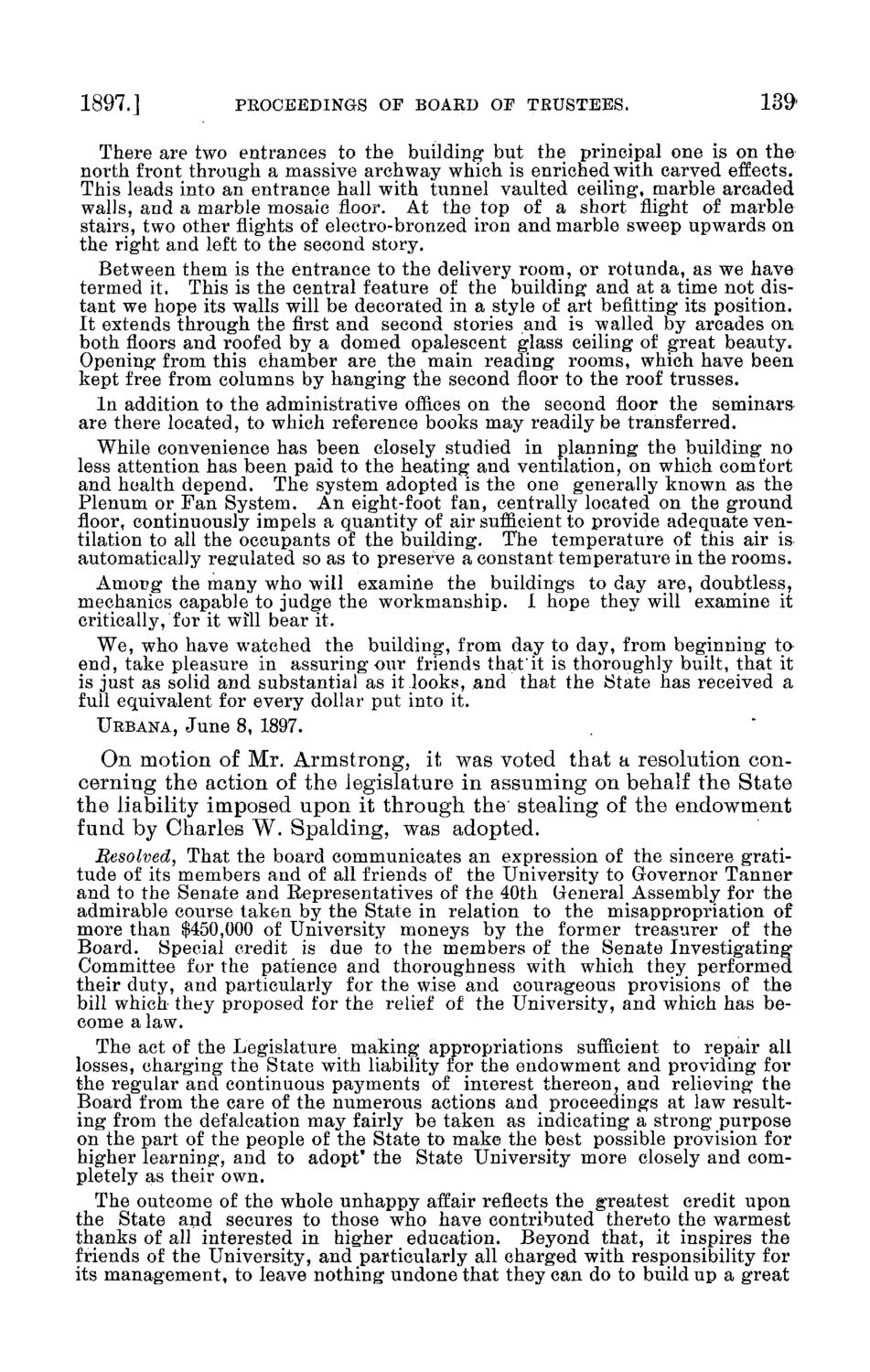| |
| |
Caption: Board of Trustees Minutes - 1898
This is a reduced-resolution page image for fast online browsing.

EXTRACTED TEXT FROM PAGE:
1897.] PROCEEDINGS OF BOARD OF TRUSTEES. 139* There are two entrances to the building but the principal one is on the north front through a massive archway which is enriched with carved effects. This leads into an entrance hall with tunnel vaulted ceiling, marble arcaded walls, and a marble mosaic floor. At the top of a short flight of marble stairs, two other flights of electro-bronzed iron and marble sweep upwards on the right and left to the second story. Between them is the entrance to the delivery room, or rotunda, as we have termed it. This is the central feature of the building and at a time not distant we hope its walls will be decorated in a style of art befitting its position. It extends through the first and second stories and is walled by arcades on both floors and roofed by a domed opalescent g;lass ceiling of great beauty. Opening from this chamber are the main reading rooms, which have been kept free from columns by hanging the second floor to the roof trusses. In addition to the administrative offices on the second floor the seminars are there located, to which reference books may readily be transferred. While convenience has been closely studied in planning the building no less attention has been paid to the heating and ventilation, on which comfort and health depend. The system adopted is the one generally known as the Plenum or Fan System. An eight-foot fan, centrally located on the ground floor, continuously impels a quantity of air sufficient to provide adequate ventilation to all the occupants of the building. The temperature of this air is automatically regulated so as to preserve a constant, temperature in the rooms. Amorg the many who will examine the buildings to day are, doubtless, mechanics capable to judge the workmanship. 1 hope they will examine it critically, for it will bear it. We, who have watched the building, from day to day, from beginning to end, take pleasure in assuring our friends that'it is thoroughly built, that it is just as solid and substantial as it looks, and that the State has received a full equivalent for every dollar put into it. URBANA, June 8, 1897. O n motion of Mr. A r m s t r o n g , it was voted t h a t a resolution conc e r n i n g t h e action of t h e legislature in a s s u m i n g on behalf the S t a t e t h e liability imposed u p o n it t h r o u g h the' stealing of t h e e n d o w m e n t fund by Charles W . S p a l d i n g , was adopted. Besolved, That the board communicates an expression of the sincere gratitude of its members and of all friends of the University to Grovernor Tanner and to the Senate and Representatives of the 40th General Assembly for the admirable course taken by the State in relation to the misappropriation of more than $450,000 of University moneys by the former treasurer of the Board. Special credit is due to the members of the Senate Investigating Committee for the patience and thoroughness with which they performed their duty, and particularly for the wise and courageous provisions of the bill which they proposed for the relief of the University, and which has become a law. The act of the Legislature^ making appropriations sufficient to repair all losses, charging the State with liability for the endowment and providing for the regular and continuous payments of interest thereon, and relieving the Board from the care of the numerous actions and proceedings at law resulting from the defalcation may fairly be taken as indicating a strong purpose on the part of the people of the State to make the best possible provision for higher learning, and to adopt" the State University more closely and completely as their own. The outcome of the whole unhappy affair reflects the greatest credit upon the State and secures to those who have contributed thereto the warmest thanks of all interested in higher education. Beyond that, it inspires the friends of the University, and particularly all charged with responsibility for its management, to leave nothing undone that they can do to build up a great
| |